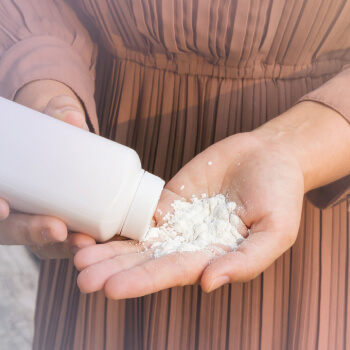Study Linking Talc Use to Ovarian Cancer Could Impact J&J Lawsuits
Editors carefully fact-check all Consumer Notice, LLC content for accuracy and quality.
Consumer Notice, LLC has a stringent fact-checking process. It starts with our strict sourcing guidelines.
We only gather information from credible sources. This includes peer-reviewed medical journals, reputable media outlets, government reports, court records and interviews with qualified experts.

A new scientific study linking talc products to ovarian cancer could significantly impact the 50,000 pending lawsuits against Johnson & Johnson, which the company is attempting to settle.
These lawsuits allege that J&J’s talcum powder-based products, marketed as safe baby care and feminine hygiene items, caused ovarian cancer. The study, published in mid-May in the Journal of Oncology, found that using talc products on the genital area was associated with an increased risk of ovarian cancer and may help bolster the plaintiffs’ claims.
Last month, the pharmaceutical giant announced a $6.48 billion plan to settle all its ovarian cancer-related claims. The settlement requires approval from claimants before J&J can address the talcum powder lawsuits by filing for bankruptcy a third time through its subsidiary, LTL Management.
The ovarian cancer lawsuits are consolidated in a multidistrict litigation overseen by a federal court in New Jersey.
“This study is quite timely. We feel like it completely affirms and confirms the position taken by plaintiffs’ experts,” Leigh O’Dell, a principal at Beasley Allen Law Firm, told NBC News.
The news could be a blow to the potential settlement as claimants weigh whether to accept or deny the proposal, which would settle 99.75% of all talc-related lawsuits against the company.
Study Includes Data From 50K Women
The new study is based on findings from the Sister Study, funded by the National Institutes of Health, which enrolled 50,884 American women with a family history of breast cancer to investigate the association between genital talc use and cancer. Researchers found that talc use was linked to a higher rate of ovarian cancer.
Johnson & Johnson has long denied the link between its talc-based products and cancer and maintains they were safe to use. It disputed earlier research linking talc products to ovarian cancer and continues to hold that stance.
“This study does not change the overwhelming evidence that talcum powder does not cause ovarian cancer,” Erik Haas, J&J’s worldwide vice president of litigation, told NBC News.
Asbestos-Contaminated Talc Claims
A smaller number of lawsuits claim that Johnson & Johnson’s talc products caused mesothelioma due to asbestos contamination. Mesothelioma is a rare cancer affecting the lungs.
A 2014 study published in the International Journal of Occupational and Environmental Health found that using talcum powder in enclosed spaces could increase the risk of inhaling asbestos. Talc and asbestos are often found together in nature because they are located close to each other in mineral deposits.
J&J talc product samples have tested positive for asbestos dating back to as early as 1971. In 2019, Johnson & Johnson recalled one lot of baby power after a sample tested by the FDA contained asbestos. It pulled its talc products from American shelves in 2020 and, in 2023, Johnson & Johnson stopped selling its talc-based baby powder globally.
The company has since switched to cornstarch in its Johnson’s Baby Powder but says the decision to do so was not due to safety concerns.